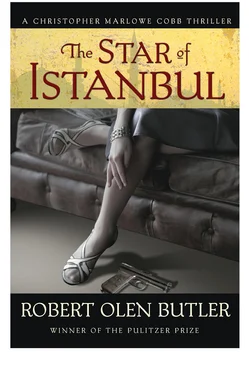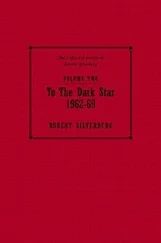The desk had a single drawer. I opened it.
On one side were three yellow Mongol pencils, finely sharpened. In the center was a ten-cent stationer’s notebook with pasteboard covers. I thumbed through it, starting from the back, and all the pages flipping by were blank. I arrived at the first page — also blank — and was about to close the cover. But I noticed where the cover joined the pages: a minute, ragged edge ran along the hinge. I looked closely. A couple or three pages had been torn out.
I closed the notebook and put it back where it had lain.
I kneeled before the drawer and looked underneath, as I drew it out as far as I could. Nothing was affixed there.
I stood up and closed the desk drawer.
I went to the commode at the forward wall.
The top drawer held folded shirts and a couple of waistcoats. I gently probed between them and beneath them, making sure the objects did not shift, did not alert Brauer to my having searched. I found nothing. The next drawer had sweaters on one side and, on the other, gloves, four-in-hands, handkerchiefs. I searched it and closed it and opened the bottom drawer. It pulled out slightly heavy on one side, but the surface contents were lightweight and uniformly distributed: underdrawers and socks and, on the heavy side, a tightly folded black silk dressing gown.
I slipped my hand beneath the gown and felt another book. I lifted away the gown and set it aside, and I picked up a copy of The Nuttall Encyclopaedia of Universal Information . Sixteen thousand self-described “terse articles” in seven hundred pages, edited by a Reverend James Wood, published in London. Placed under Brauer’s dressing gown in the bottom drawer of the commode, it felt hidden.
I thumbed the densely set, two-columned pages and found no markings, nothing placed in the leaves.
On a personal impulse I turned to a listing under “C.” And I read: Cobb, Isabel, a celebrated American actress, born in St. Louis, Missouri; appeared in London in 1885 and 1897; represented, among other characters, Juliet, Rosalind, Kate, and Lady Macbeth. b. 1859.
My mother’s entry was five lines long. I turned to the entry on “Islam.” That major religion, one of Brauer’s lecture topics, was dealt with in nine lines, terse to the point of vapidity.
Brauer was intellectually arrogant. He found me and my work beneath him, even as it rated the captain’s table, a thing that quite literally stopped him in his tracks in the dining room the other night. He would find Nuttall contemptible.
And the reason he was traveling with it was instantly clear to me, thanks to my months with Trask’s own lecturers. It was a code book. The exact same volume was in the possession of Brauer’s handler, wherever he might be posted; it was no doubt sitting, as well, on a desk in the Auswärtiges Amt , Wilhelmstraße 76, Berlin, the German Foreign Office. Perhaps the book was even in the possession of other German secret agents. Some, perhaps, with different cover stories, different useful skills, might even have lain in bed at night in their rented flats in London or Edinburgh or Liverpool or Southampton and browsed the book, might even have hidden the book proudly in plain sight.
Not Brauer. This book tweaked his lifted nose. But he had to use it to decode the instructions he got from the boys in Berlin. They’d telegraph him blocks of numbers referencing page and column and line and word in the book. An unbreakable code, without knowing what the shared book was. Books like this went through various editions; I checked the copyright page. 1909. This would be useful to Trask. We would know the Huns by their Nuttall s. Perhaps even read their secret messages.
I put the book back in its place and the dressing gown on top of it. Silk seemed out of character for Brauer. Maybe this was a gift for a woman. You wouldn’t think it to talk with him. But you wouldn’t think in private he’d suddenly dress like a dude.
I closed the drawer and thought about the process: he’d get a telegram; the telegram consisted of blocks of numbers; he’d follow the numerical instructions to find each word in Nuttall; he’d write the words down. Perhaps he’d even received a message on the Lusitania . For war security, passengers couldn’t send telegrams, but we could receive them.
I looked back to the desk.
I stepped to it and opened the drawer and removed the notebook. Whenever he’d received his last message — on the ship or before he sailed — it was decoded into this notebook. I opened the cover and carefully tore out the top sheet. The paper was pretty thin and the Mongol was a hard No. 2, perhaps requiring enough pressure that it would make an indent on the page below. The tear went cleanly. Its absence would not be noticed. I had hopes.
Then I gave every piece of furniture in the suite the treatment, looking behind and beneath, and with the commode I drew the drawers out as far as possible and checked their undersides as well.
The sitting room had given me all that it could.
I had one more room to go.
I stepped through the darkened bedroom doorway. I have a pretty keen sense of smell, and in the dark, without the distraction of my primary sense, it was even keener. I could not place the faint smell but something was in the air. My first thought: saltwater mildew from the first-class bathroom in the far wall.
I turned the electrical key and the place lit up. I looked toward that far wall. On the left, the door into the bathroom was closed; I myself stood in the mirror directly before me, hanging over the dresser; and on the right, built as a wedged corner piece, was a marble-topped washbasin. Something caught my eye there. I moved the length of the room, aware in my periphery of the two beds arranged foot to foot, as in Selene’s suite, but keeping my eyes on what seemed the unusual detail.
Now I stood before the washbasin. And I was right. Two men’s straight razors were neatly laid side by side. Two shaving mugs sat behind them. And in one drinking glass, two bone-handled toothbrushes leaned away from each other at the top but angled down to the bottom of the glass where their tips touched.
I knew the smell.
I turned. On one of the beds the covers were stripped open, the sheet exposed.
And all the oddness I’d felt in the Smoking Room, trying to understand Edward Cable as a player in the game of German secret service, was explained. He was simply a bookseller from Boston, sharing a secret, certainly, with Walter Brauer, but not the one I was seeking to understand.
After thoroughly searching the bedroom and finding nothing further of interest, I slipped out of Brauer’s suite and left him and Cable behind for a couple of hours. I ate à la carte in the Verandah Café and I strolled the promenade and I settled into the still mostly empty Smoking Room, and until the moment I pulled out my cigarettes and lit one up, I thought about other things. About my feature story and about the reporting I would do in the other role I still played — no matter where I went, I’d find stories for Christopher Cobb to cover — and I thought about the Cubs, how I’d miss hearing the scores through the summer, and about the new Chicago Federal League team and their swell new ballpark on Addison. And I thought about Selene, though I tried not to, as I was determined for the rest of the night to keep my thinking just as it would have been before I went to Mexico last year, when I was simply Christopher Cobb, war correspondent.
But when I lit up a cigarette on the end of a couch in the Smoking Room, I let my thoughts turn once more to Brauer. Oddly, he seemed more human to me now. Not so easy to despise. I’d been around a lot of men in tough situations and I knew that these feelings existed in the world. Sometimes men even responded to the stress of battle by reaching out like that. I was ready to think that Brauer wasn’t working on board, that he was simply in transit to London, that I’d simply have to follow him to the city and continue to keep track of him there. And I did have the slip of paper in my pocket and a chance to get a little something out of it.
Читать дальше












